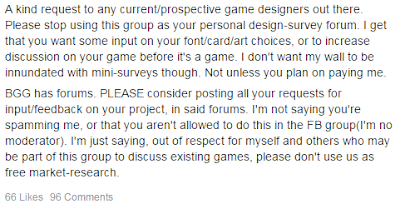EVERYONE HATES SPAM.
And everyone seems to have a hair trigger response to anything they think qualifies as spam. There was a discussion on the Boardgame Geek Facebook page recently that highlighted this very point. It began with this:
This led to a long drawn out and very messy conversation/debate from many angles. But then someone added this:
It rings true. There is such a fine line between being seen as spam and getting actual interest in your product that it's decayed and broken. It's like tightrope walking on a wire that's fiber thin. So what do you do? Well, you can look to the advice of those proven successful or simply look at what they do.
James Mathe (Minion Games) and Jamey Stegmaier (Stonemaier Games) are established pillars of the gaming community in multiple fashion. They each have blogs that will give you detailed examples and "how to"s that are considered the cornerstones of game manufacturing information today. But how did they do that? And what if you aren't going to be a blog writer gaming guru?
I asked James Mathe and his group over at Tabletop Game Kickstarter Advice how you get word out without becoming a spammer.
James Mathe said, "That's not an easy question to answer. You kind of have to be a spammer; but a nice one that doesn't go overboard."
But how to do that?
James Campbell of "I will never grow up gaming" said: "Contribute to the wider community for months before getting the word out. Don't push your product continuously. Provide helpful and informative commentary about things other than your product regularly."
And he's absolutely right. You have to give people a chance to get to know you as a person. Not as a designer or anything else. A person. After all, unless your brand skyrocketed and got word out everywhere at once, no one knows who you are. It's going to take time in talking to people and learning about their interests. That means that not all your posts should be about your product. The same rings true for books if you are an author. So what do you do?
While it's hard to post to lots of groups and keep up, you should try to be involved as much as you can. But you should only post updates about your product once a week at maximum. All the rest should be interest in group discussions. Your product may become relevant to some discussions, but avoid making all discussions sideline to your game or book. Take interest in other peoples interests. If you don't have tons of advice to offer, then become the student rather than the teacher. Aim to learn new stories, games, and get to know people for who they are.
Over time as people watch you online (and make no mistake, they will be watching) interest will grow. You will get approached with questions. When that happens, you are in a good position. Don't overdo it. Keep your response simple and give a link to where they can get a good look at your game ( if you aren't on Boardgame Geek, why not?). Or be able to give a nutshell run down on your game. Then leave it up to them to continue for more information. I like to give a link to my page on Boardgame Geek and remain approachable if they have questions.
Never send unsolicited messages to people in social media about your game. If you see someone posting interest in a game like yours. Ask them on the public forum: Hey, I have a game that fits what you are asking for, would you like to know more about it? Then back off.
Keep these realities in mind; even though you have an accomplishment you want to shout to the mountain tops.
-People hear about this guy or that guy has made a new game, every single day. Some people get sick of it. So bear that in mind. The better they know who you are, the more likely they may want to hear what you have to say.
-There is no holy grail of gaming. Don't pop in out of nowhere and claim that your game is the greatest ever made. It's one of the biggest red flags out there.
-Never bash another designer, especially when you're new. Just don't do it. Stick with what's good about your and your brand, not what's bad about someone else's.
-Patience is a virtue, no matter what aspect of your brand or reaching people you are thinking of. Rushing only looks desperate.
Do you have a tip you'd like to share? Feel free to post in comments.


No comments:
Post a Comment